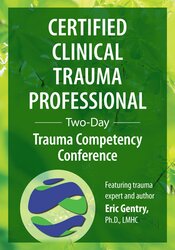
×

After decades of treating traumatic stress, we have learned that effective treatment can be simple… but it’s not easy.
Studies indicate that there are four key elements to effective trauma treatment. When you accomplish these four key elements in treatment with your clients, you will be able to reduce their symptoms and improve clinical outcomes. Attend this workshop and you will walk away with a step-by-step four-stage framework for navigating essential elements of trauma treatment with your traumatized clients.
The essential elements are common to all evidence-based trauma treatments, you will learn how you can integrate this framework with your current approach or methodology to improve how you treat trauma. Join J. Eric Gentry, PhD, LMHC, DAAETS, FAAETS, CCTP as he shows you how this trauma competency training can give you tools and techniques for your clinical practice and help improve your trauma treatment outcomes, just as he has for other clinicians around the world.
Best of all, upon completion of this live training, you’ll be eligible to become a Certified Clinical Trauma Professional (CCTP) through Evergreen Certifications. Certification lets colleagues, employers, and clients know that you’ve invested the extra time and effort necessary to understand the complexities of trauma counselling. Professional standards apply. Visit www.evergreencertifications.com/CCTP for details.
CERTIFICATION MADE SIMPLE!
Attendees will receive documentation of CCTP designation from Evergreen Certifications 4 to 6 weeks following the program.
*Professional standards apply. Visit www.evergreencertifications.com/CCTP for professional requirements.
All members of the PESI, Inc. planning committee have provided disclosures of financial relationships with ineligible organizations and any relevant non-financial relationships prior to planning content for this activity. None of the committee members had relevant financial relationships with ineligible companies or other potentially biasing relationships to disclose to learners. For speaker disclosures, please see the faculty biography.
Continuing education credit information is coming soon for this live webcast.

J. Eric Gentry, PhD, LMHC, DAAETS, FAAETS, CCTP, is an internationally recognized leader in the study and treatment of traumatic stress and compassion fatigue. His PhD is from Florida State University where he studied with Professor Charles Figley – a pioneer of these two fields. In 1997, he co-developed the Accelerated Recovery Program (ARP) for compassion fatigue – the world’s only evidence-based treatment protocol for compassion fatigue. In 1998, he introduced the Certified Compassion Fatigue Specialist Training and Compassion Fatigue Prevention & Resiliency Training. These two trainings have demonstrated treatment effectiveness for the symptoms of compassion fatigue, and he published these effects in several journals. He has trained over 100,000 health professionals over the past 20 years.
He has written numerous chapters, papers, and peer-reviewed journal articles in the areas of traumatic stress and compassion fatigue. Dr. Gentry is a Master Traumatologist with over 35 years of clinical experience with trauma, Complex PTSD, personality disorders, and dissociation.
He is the president and CEO of The Forward Facing® Institute and owner of Compassion Unlimited – a private psychotherapy, training, and consulting practice – in Phoenix, AZ.
|
2-Day Certified Clinical Trauma Professional: Two-Day Trauma Competency Conference
Thu, Jan 09, 2025 - 09:00am to Fri, Jan 10, 2025 - 05:00pm EST - Product Code LWC059081 |
For live CE credit, you must watch the live webcast in its entirety at its scheduled time and complete the CE quiz and evaluation within one week. You will have access for 90 days after the program for review.
Please note: Each day there will be a 70-minute lunch and two 15-minute breaks; one in the morning and one in the afternoon. Lunch and break times will be announced by the speaker and at their discretion. A more detailed schedule is available upon request.
Visit our FAQ page at https://www.pesicanada.ca/faq or contact us at https://www.pesicanada.ca/contact-us.
The Evolution of Traumatic Stress:
Conceptualize how traumatic stress develops
Core Competencies of Traumatic Stress Bio-Psycho-Social-Spiritual Factors that Produce Anxiety & Traumatic Stress:
How events can become symptoms
Neurobiology and Biology of Traumatic Stress:
Deeper understanding of the impacts of trauma
A Framework of Healing for Survivors of Traumatic Stress:
The simplicity of trauma resolution
Effective Treatment Interventions:
Review of the go-to evidence-based approaches
Assessment of Traumatic Stress Disorders:
Connect clients to a diagnosis
Evidence-Based Strategies for Trauma Therapy:
Skills to integrate for stabilization and treatment
Empowerment & Resilience Treatment Structure:
Client adaptive and overdaptive coping behaviors
Interactive Exercises/Application of Skills:
Live demonstrations to practice skills
The Role of Traumatic Stress in Other Clinical Disorders:
Considerations for Personality Disorders, Dissociative Identity Disorder & more
| 5 |
|
| 4 |
|
| 3 |
|
| 2 |
|
| 1 |
|
Satisfaction Guarantee
Your satisfaction is our goal and our guarantee. Concerns should be addressed to info@pesicanada.com.
Please wait ...